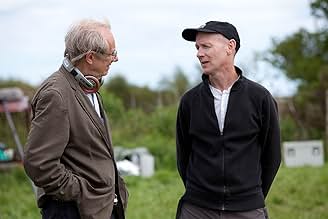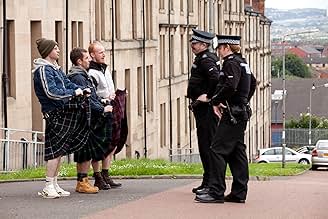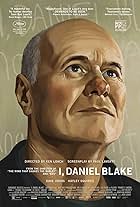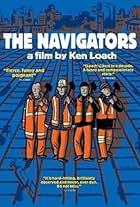Narrowly avoiding jail, new dad Robbie vows to turn over a new leaf. A visit to a whisky distillery inspires him and his mates to seek a way out of their hopeless lives.Narrowly avoiding jail, new dad Robbie vows to turn over a new leaf. A visit to a whisky distillery inspires him and his mates to seek a way out of their hopeless lives.Narrowly avoiding jail, new dad Robbie vows to turn over a new leaf. A visit to a whisky distillery inspires him and his mates to seek a way out of their hopeless lives.
- Awards
- 7 wins & 10 nominations
Jasmin Riggins
- Mo
- (as Jasmine Riggins)
- Director
- Writer
- All cast & crew
- Production, box office & more at IMDbPro
Storyline
Did you know
- TriviaFirst time actor Paul Brannigan was, like his character, a former prison inmate. He met Paul Laverty when the screenwriter was visiting various youth centers to get an idea of how young people in Scotland felt and spoke.
- GoofsWhen Albert is sitting on Rhino's shoulder looking through the pub window you can see the cameraman's reflection in the window on the right of Albert. The cameraman's reflection becomes even more visible after Rhino puts Albert down.
- Quotes
Station Master: [over the speaker in the train station] This is God calling. Get off the fucking track, will you?
- Alternate versionsThe UK release was cut, the distributor chose to reduce the number of uses of very strong language in order to obtain a 15 classification. An uncut 18 classification was available.
- ConnectionsFeatured in At the Movies: Cannes Film Festival 2012 (2012)
Featured review
'Never judge a book by it's cover' is a line used roughly halfway through this relatively benign recent effort from British directing stalwart Ken Loach. This is a maxim to keep in mind if approaching Angel's Share with the poster's main advertising soundbite 'Scotland's answer to The Full Monty' as a trusted precursor. Like wine or whisky tasting itself, much of a film's effect is to do with the aftertaste, and it is only in the closing third of the film that the aforementioned tagline could bolster a challenge to be relevant at all, as Angel's Share, upon full viewing, provides an awkward mixture of traditional 'Loachian' working-class realism with lovable-rogue, schadenfreude comedy.
There is much to like and take away from Angel's Share, including great dialogue, brilliant comedy and memorable characters. The problem is that these elements span what feels like two films fighting each other to exist in one, with neither sitting comfortably together or allowing the viewer to solidify a perspective to settle on in terms of their relation to the main characters. It could certainly be argued that this should precisely be the case for the parts of the film which reflect how ambiguously and inconsistently characters in real life can behave, but when Loach suddenly wants to do good on that tagline, all that comes before betrays the impish, happy-go-lucky final third that is well written yet foreboded by scenes not dissimilar from the violence in films like Sweet Sixteen. Imagine some of the generic, heart-warming, feel-good comedy scenes in The Full Monty interspersed with gang beatings and attempted grievous bodily harm and you can imagine the failed dichotomy displayed during Angel's Share.
This disharmony in tone, however, is pleasingly the only main fault of the film, which can certainly be included as another of Loach's great accomplishments. Taken on a scene-by-scene basis, both the characters and the actors portraying them are addictively watchable, as they blunder and plunder as worst and best they can in the context of their worlds. The theme, born from the meaning of the title itself, is subtly explored and comes wonderfully full circle as that aftertaste at the end is about to kick in. There is honest drama amongst the frivolous escapading, much coming via the standout performance by John Henshaw as the poor guy charged with overseeing the group's community service tasks. It also includes the only known example to me of the use of '(I'm Gonna Be)' 500 Miles by The Proclaimers where the lyrics actually fit the context of the story as opposed to simply occupying a clip because they are Scottish (other stereotypes do exist, however, such as Irn Bru and kilt wearing, though these also exist in logical situations even if they may grate some at the front end).
Loach's style is never compromised as regards to the way the film is shot, even if it strays in tone come the end of the story. Glasgow is shown rather than shown off, with barely an establishing shot in sight, helping to bring the viewer down to the level at which the characters themselves exist at - drab interiors, hostile alleyways, rundown tenement areas, etc. It is when the group set off on their daring 'heist' that the beautiful shots of the Highlands offer a sensible contrast as a visual metaphor - the job at hand providing faint hope of starting afresh (even though it is still a crime they are intending to commit). An awful, almost ten-minute tour of the whiskey distillery makes you feel like you've wandered into the filming of a tour itself rather than still watching a film, but is subsequently saved by the attempted pilfering of the 'Holy Grail' of whiskies - perfectly paced and ramped up with tension. In fact the crux of the story is so well crafted it almost makes you forget how little reason you should have to root for the success of the group's plan in the first place.
Intentionally ambiguous yet jarringly inconsistent, Angel's Share succeeds in delivering an entertaining and memorable mixture of comedy and drama. Just ignore that tagline, and watch out for the aftertaste . . .
There is much to like and take away from Angel's Share, including great dialogue, brilliant comedy and memorable characters. The problem is that these elements span what feels like two films fighting each other to exist in one, with neither sitting comfortably together or allowing the viewer to solidify a perspective to settle on in terms of their relation to the main characters. It could certainly be argued that this should precisely be the case for the parts of the film which reflect how ambiguously and inconsistently characters in real life can behave, but when Loach suddenly wants to do good on that tagline, all that comes before betrays the impish, happy-go-lucky final third that is well written yet foreboded by scenes not dissimilar from the violence in films like Sweet Sixteen. Imagine some of the generic, heart-warming, feel-good comedy scenes in The Full Monty interspersed with gang beatings and attempted grievous bodily harm and you can imagine the failed dichotomy displayed during Angel's Share.
This disharmony in tone, however, is pleasingly the only main fault of the film, which can certainly be included as another of Loach's great accomplishments. Taken on a scene-by-scene basis, both the characters and the actors portraying them are addictively watchable, as they blunder and plunder as worst and best they can in the context of their worlds. The theme, born from the meaning of the title itself, is subtly explored and comes wonderfully full circle as that aftertaste at the end is about to kick in. There is honest drama amongst the frivolous escapading, much coming via the standout performance by John Henshaw as the poor guy charged with overseeing the group's community service tasks. It also includes the only known example to me of the use of '(I'm Gonna Be)' 500 Miles by The Proclaimers where the lyrics actually fit the context of the story as opposed to simply occupying a clip because they are Scottish (other stereotypes do exist, however, such as Irn Bru and kilt wearing, though these also exist in logical situations even if they may grate some at the front end).
Loach's style is never compromised as regards to the way the film is shot, even if it strays in tone come the end of the story. Glasgow is shown rather than shown off, with barely an establishing shot in sight, helping to bring the viewer down to the level at which the characters themselves exist at - drab interiors, hostile alleyways, rundown tenement areas, etc. It is when the group set off on their daring 'heist' that the beautiful shots of the Highlands offer a sensible contrast as a visual metaphor - the job at hand providing faint hope of starting afresh (even though it is still a crime they are intending to commit). An awful, almost ten-minute tour of the whiskey distillery makes you feel like you've wandered into the filming of a tour itself rather than still watching a film, but is subsequently saved by the attempted pilfering of the 'Holy Grail' of whiskies - perfectly paced and ramped up with tension. In fact the crux of the story is so well crafted it almost makes you forget how little reason you should have to root for the success of the group's plan in the first place.
Intentionally ambiguous yet jarringly inconsistent, Angel's Share succeeds in delivering an entertaining and memorable mixture of comedy and drama. Just ignore that tagline, and watch out for the aftertaste . . .
- daveyboy-1
- Jan 10, 2014
- Permalink
Details
- Release date
- Countries of origin
- Official site
- Language
- Also known as
- Nổi Loạn
- Filming locations
- Production companies
- See more company credits at IMDbPro
Box office
- Gross US & Canada
- $346,669
- Opening weekend US & Canada
- $18,837
- Apr 14, 2013
- Gross worldwide
- $13,090,471
- Runtime1 hour 41 minutes
- Color
- Sound mix
- Aspect ratio
- 1.85 : 1
Contribute to this page
Suggest an edit or add missing content

































